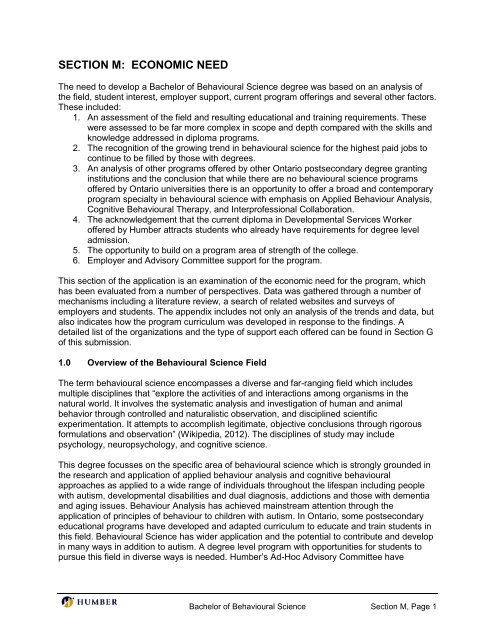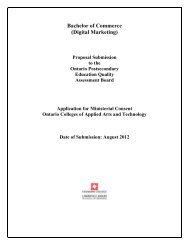Bachelor of Behavioural Science - Postsecondary Education Quality ...
Bachelor of Behavioural Science - Postsecondary Education Quality ...
Bachelor of Behavioural Science - Postsecondary Education Quality ...
You also want an ePaper? Increase the reach of your titles
YUMPU automatically turns print PDFs into web optimized ePapers that Google loves.
SECTION M: ECONOMIC NEED<br />
The need to develop a <strong>Bachelor</strong> <strong>of</strong> <strong>Behavioural</strong> <strong>Science</strong> degree was based on an analysis <strong>of</strong><br />
the field, student interest, employer support, current program <strong>of</strong>ferings and several other factors.<br />
These included:<br />
1. An assessment <strong>of</strong> the field and resulting educational and training requirements. These<br />
were assessed to be far more complex in scope and depth compared with the skills and<br />
knowledge addressed in diploma programs.<br />
2. The recognition <strong>of</strong> the growing trend in behavioural science for the highest paid jobs to<br />
continue to be filled by those with degrees.<br />
3. An analysis <strong>of</strong> other programs <strong>of</strong>fered by other Ontario postsecondary degree granting<br />
institutions and the conclusion that while there are no behavioural science programs<br />
<strong>of</strong>fered by Ontario universities there is an opportunity to <strong>of</strong>fer a broad and contemporary<br />
program specialty in behavioural science with emphasis on Applied Behaviour Analysis,<br />
Cognitive <strong>Behavioural</strong> Therapy, and Interpr<strong>of</strong>essional Collaboration.<br />
4. The acknowledgement that the current diploma in Developmental Services Worker<br />
<strong>of</strong>fered by Humber attracts students who already have requirements for degree level<br />
admission.<br />
5. The opportunity to build on a program area <strong>of</strong> strength <strong>of</strong> the college.<br />
6. Employer and Advisory Committee support for the program.<br />
This section <strong>of</strong> the application is an examination <strong>of</strong> the economic need for the program, which<br />
has been evaluated from a number <strong>of</strong> perspectives. Data was gathered through a number <strong>of</strong><br />
mechanisms including a literature review, a search <strong>of</strong> related websites and surveys <strong>of</strong><br />
employers and students. The appendix includes not only an analysis <strong>of</strong> the trends and data, but<br />
also indicates how the program curriculum was developed in response to the findings. A<br />
detailed list <strong>of</strong> the organizations and the type <strong>of</strong> support each <strong>of</strong>fered can be found in Section G<br />
<strong>of</strong> this submission.<br />
1.0 Overview <strong>of</strong> the <strong>Behavioural</strong> <strong>Science</strong> Field<br />
The term behavioural science encompasses a diverse and far-ranging field which includes<br />
multiple disciplines that “explore the activities <strong>of</strong> and interactions among organisms in the<br />
natural world. It involves the systematic analysis and investigation <strong>of</strong> human and animal<br />
behavior through controlled and naturalistic observation, and disciplined scientific<br />
experimentation. It attempts to accomplish legitimate, objective conclusions through rigorous<br />
formulations and observation” (Wikipedia, 2012). The disciplines <strong>of</strong> study may include<br />
psychology, neuropsychology, and cognitive science.<br />
This degree focusses on the specific area <strong>of</strong> behavioural science which is strongly grounded in<br />
the research and application <strong>of</strong> applied behaviour analysis and cognitive behavioural<br />
approaches as applied to a wide range <strong>of</strong> individuals throughout the lifespan including people<br />
with autism, developmental disabilities and dual diagnosis, addictions and those with dementia<br />
and aging issues. Behaviour Analysis has achieved mainstream attention through the<br />
application <strong>of</strong> principles <strong>of</strong> behaviour to children with autism. In Ontario, some postsecondary<br />
educational programs have developed and adapted curriculum to educate and train students in<br />
this field. <strong>Behavioural</strong> <strong>Science</strong> has wider application and the potential to contribute and develop<br />
in many ways in addition to autism. A degree level program with opportunities for students to<br />
pursue this field in diverse ways is needed. Humber‟s Ad-Hoc Advisory Committee have<br />
<strong>Bachelor</strong> <strong>of</strong> <strong>Behavioural</strong> <strong>Science</strong> Section M, Page 1
















